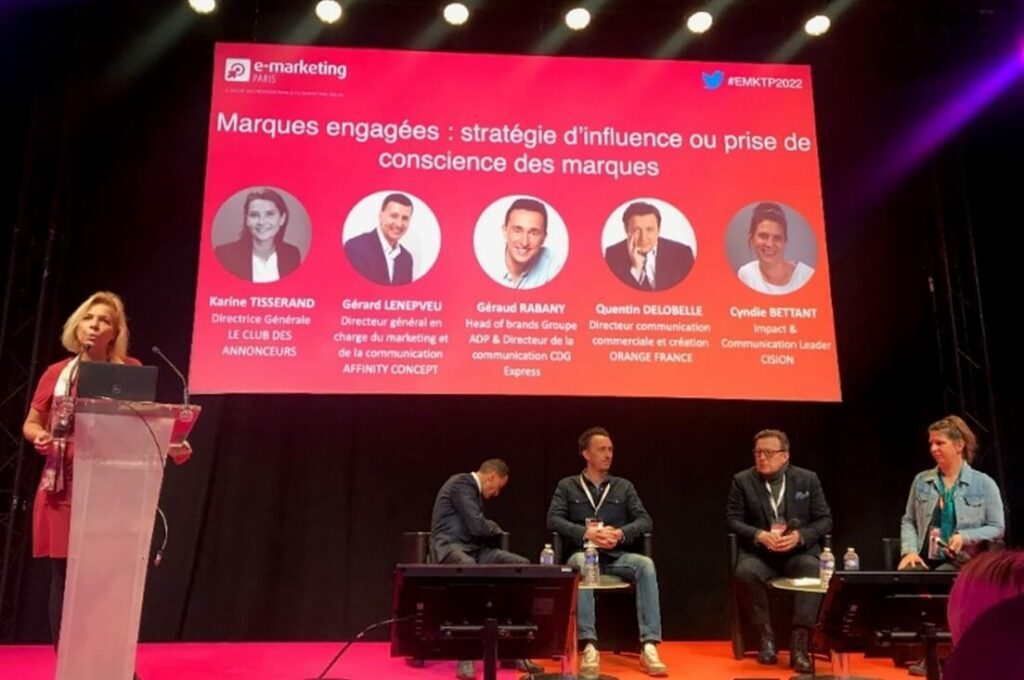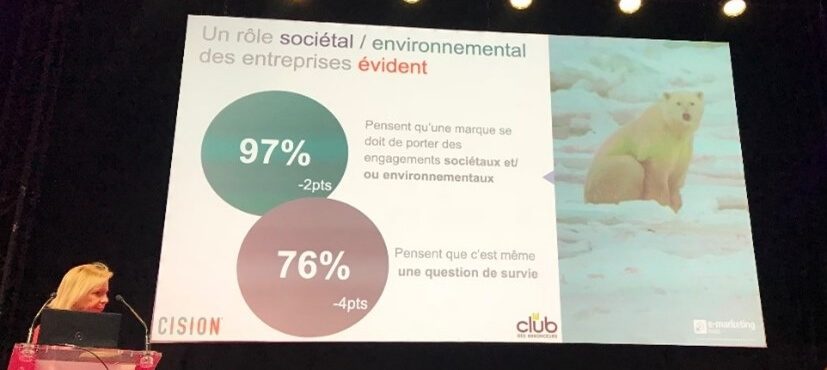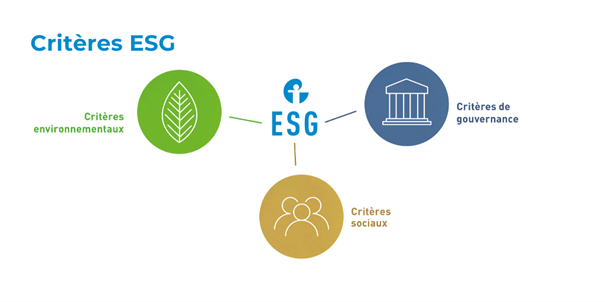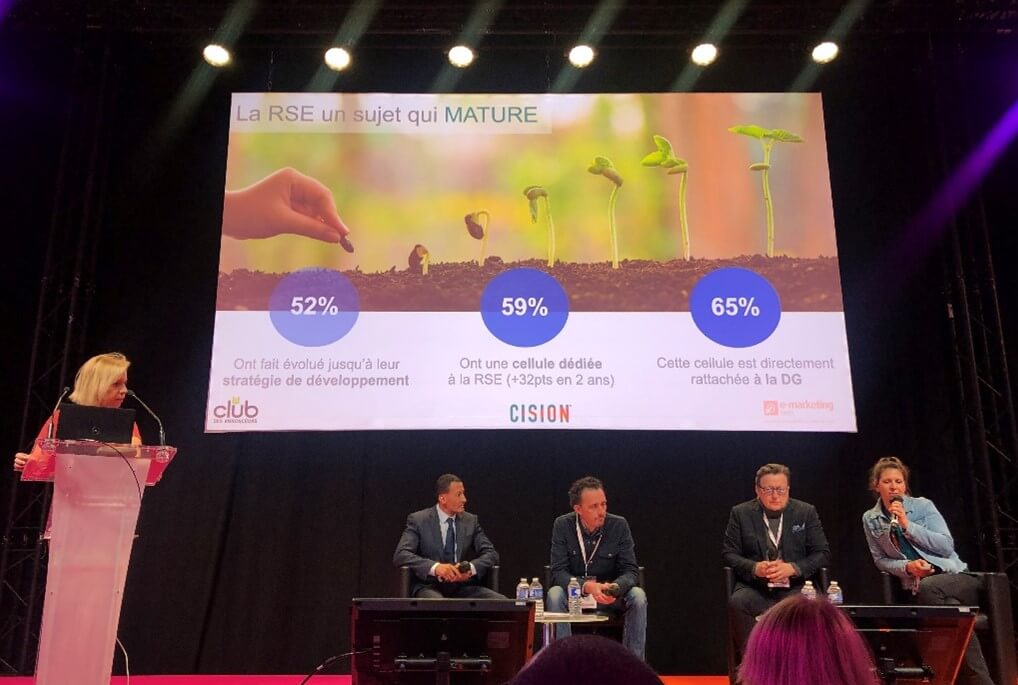
From March 29 to 31, 2022, at the Parc des Expositions, the E-marketing trade show took place. The show brought together professionals to discuss topical issues, including CSR.
We took part in a conference entitled " Committed brands: Strategy of influence or brand awareness ". 4 communication & marketing professionals gathered around the moderator Cécile Delettre, an expert in communication and marketing.
 The panel belongs to the Club des Annonceurs, a think tank of 170 communication and marketing experts. The club's mission is to decipher trends, reflect on tomorrow's issues and reinvent their professions accordingly.
The panel belongs to the Club des Annonceurs, a think tank of 170 communication and marketing experts. The club's mission is to decipher trends, reflect on tomorrow's issues and reinvent their professions accordingly.
First, the "engaged brands" barometer was presented , a tool co-constructed in 2019 by the club des Annonceurs and Cision, "brand scout" and " leader worldwide solutions and services for press relations, influence, monitoring and media intelligence".
507 marketing and communications professionals were surveyed in France to answer questions relating to brand commitments in the wake of the Covid-19 crisis. The aim was to assess the current state of CSR in companies by sector in France, and to demonstrate its importance.
Why and how do brands get involved today?
The environmental issue has accelerated post-Covid. Gérard Lenepveu points out that " it'snot us who have changed , but the times that have changed us".

Companies are at the heart of these environmental challenges, and their CSR commitments are manifold: employee well-being, reduction of carbon footprints or internal ecological practices ... The initiatives taken by companies and desired by employees coincide in the majority of cases.
Actions differ from sector to sector. In the aviation sector, Géraud Rabany describes the environmental transition as a "question of survival", and a " necessity ". Indeed, it has to be said that travelers are increasingly reluctant to take the plane because of the consequent carbon footprint of a flight.
In the telecoms sector, Quentin Delobelle, head of communications for Orange boutiques, is using recycled plastic for Internet boxes, no longer traveling abroad to shoot commercials, and more committed communication on various platforms.
Today, CSR is an obligation if companies are to survive, at the risk of "downgrading" customers, employees and potential candidates for those who do not make it a central part of their strategy.
Indeed, consumers are increasingly sensitive to the commitment of the brands they consume. The rise of Do It Yourself, organic, anti-waste and vegan and/or "cruelty free" products is evidence of more eco-responsible consumer behavior. What's more, recent health scandals have heightened their vigilance.
Companies need to acquire social acceptability if they are to continue to exist. On the employee and candidate side, well-being at work, work/life balance, diversity and inclusion are criteria on which the latter are increasingly scrutinizing. A 2015 Global Tolerance study revealed that 62% of young people only want to work "for companies that deliver a positive environmental and social impact".
But how do you measure the impact of your strategies? This remains difficult for 50% of respondents. ESG criteria are currently the most reliable indicator, but there are still disparities.
 Source: Mon Epargne et moi
Source: Mon Epargne et moi
Beware of greenwashing!
 We've just seen that brands are increasingly committed to CSR, and are multiplying their CSR initiatives, but the French remain dubious about this great enthusiasm on the part of brands. Companies often communicate a great deal, sometimes at the expense of concrete action. As a result, the French point to the gap between what is said and what is actually done. greenwashing.
We've just seen that brands are increasingly committed to CSR, and are multiplying their CSR initiatives, but the French remain dubious about this great enthusiasm on the part of brands. Companies often communicate a great deal, sometimes at the expense of concrete action. As a result, the French point to the gap between what is said and what is actually done. greenwashing.
According to the "Committed Brands" barometer, 80% of marketers and communicators confirm that Greenwashing is alive and well within companies. "According to Quentin Delobelle, "Surprising for those in charge!
To counter this trend, companies need to focus on the virtue of proof. Indeed, evidence-based education is the most effective way of showing consumers that companies are really getting things done. For example, Géraud Rabany (Head of brands at Aéroport de Paris and Director of communications at CDG Express) tells us that he has applied this strategy at Orly airport. From the moment they enter the airport to their boarding gate, travelers can discover several inserts demonstrating the results of certain actions (e.g.: geothermal energy has helped reduce carbon emissions by over 60% since 2009 - a system has been installed to cover up to 70% of water heating in Orly airport).
Consumer expectations VS. Corporate actions: on the same wavelength?
The actions of companies are very honorable, but sometimes little in line with consumer expectations. Are companies missing something? Are they as "customer-centric" as they claim?
Consumers expect companies to "accompany them in their daily lives, to support them through the good times and the bad", Gérard Lenepveu points out. For example, in a world where life is becoming increasingly expensive, purchasing power is becoming a priority. So they expect companies to lower prices (or at least not raise them). But that's not where companies are heading! Can we speak of a clash of concerns? Whatever the case, brands need to adapt their commitments to their customers' needs if they are to retain their appeal.
Organizational transformation within companies is essential
General management is showing increasing interest in CSR. " The subject has grown to such an extent that we have to leave it to people who manage it better than we do," concedes Géraud Rabany.

"CSR transformation will follow the same path as digital transformation. Digitalization was about tools, and for CSR, it will be about practices."
The digital transformation that has been taking place in all companies over the past twenty years has proven to be universally necessary. Teams have been set up, budgets allocated, to enable all the expertise within a company to jump on the digitalization bandwagon. Who knows, in a few months/years' time, we'll be seeing the emergence of teams entirely dedicated to CSR within companies?
Meanwhile, CSR already has a legal framework, supported by the PACTE law. Since its promulgation in 2019, the Pacte law has offered organizations the opportunity to go further in terms of corporate social responsibility. In particular, it allows them to include a " raison d'être " in their bylaws and adopt a new model, that of a " mission-driven company ".
In addition to this "horizontal" movement, a new, more "vertical" movement is shaking up the way companies operate. Companies have to adapt to bottom-up movements.
Employees are increasingly urging their companies to get involved. To make these initiatives sustainable, management needs to give them greater power, financial resources and legitimacy.
CSR is now an integral part of corporate strategy. In the face of changing consumer behavior and employee expectations, CSR needs to be given more resources and placed at the heart of decision-making.
By Cira Diagana & Léa Veryepe
--------
Sources :
- Triple Pundit - HR Directors Must Sell CSR To Win Millennial Job Candidates

